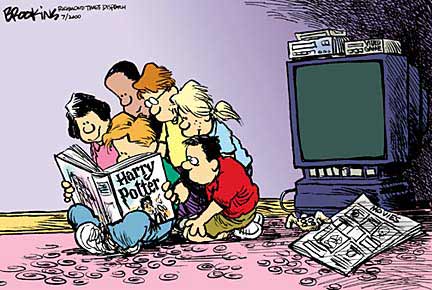Wednesday, May 09, 2007
Reasons
Each family deals with its own dynamics in its own way. This is, of course, as it should be. I wonder sometimes if each family might benefit from thinking a little more in terms of how decisions made by the parents will affect its various members in locations other than the home itself. As parents, we see only what's going on at home; we don't see how what's going on at home also changes what's going on at school. Sometimes I think we just don't want to know.As a teacher, I saw, year after year, children who went from top-of-the-class to little staring zombies, because of a decision made by parents. I had to watch promising young people deteriorate before my eyes because of a decision made by parents. I watched children become virtual caretakers. I saw kids put in charge of younger siblings, and held responsible for anything that happened. I had to see children carry messages from parent to parent or, worse, wait in vain for some kind of message from the parent who is no longer there. I saw kids standing in front of the school after dark because each parent figured the other parent was picking up that night. I saw kids crying in the hallways because they were going to miss a dance or a party because it was the OTHER parent's weekend and there was no switching allowed. And so, so often, things the child used to do are no longer possible because the money situation has changed and every little thing now means outraged outbursts from the parent who is supposed to pay. I hated seeing children worrying about lost notebooks and new school supplies because they were scared to tell either parent about yet another expense because it always triggered a fight about whose turn it was to pay. I've had kids tell me outright that they feel like the rope in a tug-of-war, and that the winner DIDN'T have to deal with the kids.
I've read essay after essay about being forced to share all their things with Mommy's new boyfriend's kids, or Daddy's new girlfriend's kids. Kids lose their rooms, their possessions, and huge chunks of time rightfully theirs, with Mommy or Daddy, because of, as one of my students put it a few years ago, ". . . kids who pass in the night." And while it's hard enough to have to watch Mommy or Daddy kiss and hug someone who isn't Mommy or Daddy, try to think how hard it must be to watch Mommy or Daddy kiss and hug someone who isn't you. . . . .
Children who were finding success were ripped from their classroom, separated from their teacher and from their friends, and placed in a new school more convenient to the parents' new living arrangements. Children had to adapt not only to a parent moving out, but also to a new school, a new teacher, new friends, new curriculum, new home. . . and you know what? Sometimes, for a child, that's just too much new stuff at once. What are we thinking?
It's easy to think that any parental decision will affect the children only in the household, and that if adults work out routines that are mutually beneficial and workable to each other, that the children in that household can automatically adapt. Often, of course, they can. Just as often, they can't. At least, not for a while. Often, these children are traumatized, and they need familiar surroundings in at least one aspect of their lives. Their home has been destroyed, through no fault of their own, and their trust in adult loyalty has been compromised, and now their school lives are being disrupted, too.
No matter how often and how sincerely parents assure their children that none of these things are their fault, most kids believe that if they'd only been better behaved, if they'd just made the team, or scored higher on that big test, or helped more around the house, etc, their parents wouldn't have fought so much until one of them moved out. With tiny children it can go even deeper, because they don't have the communication skills to articulate their pain. They only know that Mommy or Daddy is gone, and all the explanations in the world aren't sufficient to reassure them about. . . . really, much of anything.
Teachers see this daily, weekly, monthly, yearly, year after year after year. We never get used to it. Even at the college level, I am reading essays about the bewildered heartbreak still inside a grown man or woman, because their parents pulled the rug out from under them twenty years ago and it still hurts.
Sometimes I think it might do these parents good if they read what their children are writing about the home situation. I wonder if these parents realize how severely some of them are disrupting their children's lives. It's so easy for adults to do their thing and assume the kids can cope, but the truth is, sometimes, it's far more important for adults to do their kids' thing and put their own lives on the back burner. And I also think that many adults simply don't want to think about the possibility that their decisions have devastated their children. That's too hard, and it's not fair, either, because "don't I deserve a little happiness?" Answer: No, you don't. Not if it means compromising your children's lives.
I saw more heartbreak and bewilderment than you could find in a country music playlist. I saw too much disillusionment, and disillusionment is hard enough to take in an adult; when you see it in a child's eyes, it's even worse. I saw it every day. I have never been able to build up any immunities to it.
If I seem harsh when I write about such things, it's because of what I have seen. I think perhaps if parents can look outside of their own situations and see these same things, more people might put their children first and themselves last, because once we have children, we are supposed to cherish them, not desert them, and not require them to change overnight because of decisions we make.
Children will always come first with me. Promises come second. Yes, I can be severe when I think about adults who put themselves first. Yes, I can be harsh when I think about adults who make and break promises easily. When it concerns people I care a lot about, I can be even harsher. This is ironic, really, because I am by nature a complete and total wuss, and there are footprints all over my back. Right now, there is a pile of soggy Kleenex by my keyboard.
Dumbledore was right. It takes a great deal of courage to stand up to your enemies, and even more to stand up to your friends. I do not feel particularly courageous. I just feel sad.


 Hitting the fan like no one else can. . .
Hitting the fan like no one else can. . .






























